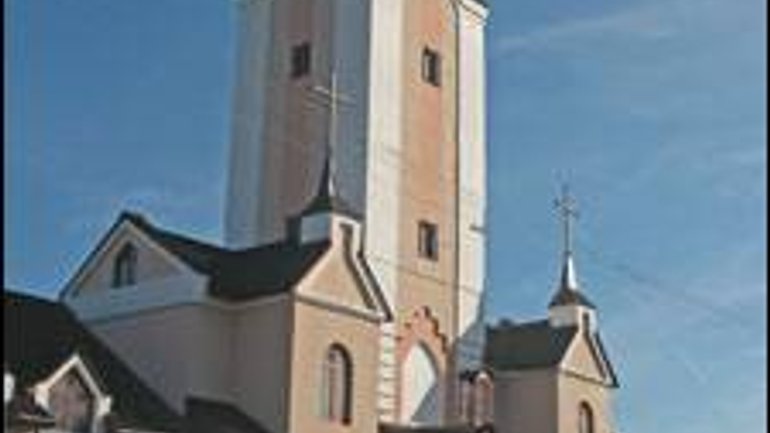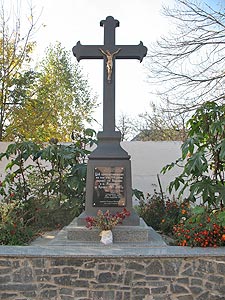St. Vatslav Roman Catholic Church in Zhytomyr Marks 100th Anniversary

Before 1911, there were two separate villages, Czech Kroshnia and Ruthenian Kroshnia. Poles lived in Kroshnia back in the 18th century and Czechs from Austro-Hungary settled here from 1868 to the 1890s. The overwhelming majority of them were Catholic. In 1907, they organized the Roman Catholic Parish of St. Vatslav in Kroshnia (today on 4 Luhovyi Lane). A Catholic, Andrii Arshenevskyi, gave the local believers land on which to construct a church as a gift. The church was built in 1908.
In what way is the name of the parish connected with St. Vatslav then? Vatslav is a saint of the Catholic Church in the Czech Republic and the main patron of the land and the Czech nation. The name “Vatslav” means “great in glory.” The son of Czech King Bratislav was born in 907. All Vatslav’s life was dedicated to the Lord’s service, rebuilding destroyed churches. He was also known for caring for the sick and poor. The saint is often depicted on icons visiting a chapel at night, as he had much work to do during the day and had no time for prayer. He was martyred for his firm faith on 29 September 929.
The martyr Vatslav was canonized, the best square in Prague bears his name, and there is a monument there presenting him as a knight riding a horse. One hundred and eighty churches and chapels have been built and dedicated to St. Vatslav. Andrii Arshenevskyi built a chapel in Kroshnia in honor of St. Vatslav so that people could come there for his intercession and ask God for his countless graces.
There were ups and downs in the century-long history of the parish. In 1948, by a decision of the Zhytomyr Executive Committee, the parish lost its registration, and a club was established in the building in the same year. Later it was closed and turned into a library. However, the library did not exist for long, as people were reluctant to go there, for they remembered that it used to be a church of God. In 1957, the Kroshnia Consumer Society was established in the Catholic buildings and in 1960 the Zhytomyr Concern of the Regional Consumer Society.
 In 2001, St. Vatslav’s Parish of the Roman Catholic Church of the Kyiv-Zhytomyr Diocese in Kroshnia was revived. In 2002, thanks to the persistent efforts of the present parish priest, Fr. Ludvig Kamilevskyi, the building was officially returned to the faithful. Fr. Kamilevskyi worked in the Lviv and Volyn regions for a long time and is very experienced in reviving Catholic churches. Therefore, Bishop Jan Purwinski, ordinary of the Kyiv-Zhytomyr Diocese, entrusted the revival of the shrine exactly to him.
In 2001, St. Vatslav’s Parish of the Roman Catholic Church of the Kyiv-Zhytomyr Diocese in Kroshnia was revived. In 2002, thanks to the persistent efforts of the present parish priest, Fr. Ludvig Kamilevskyi, the building was officially returned to the faithful. Fr. Kamilevskyi worked in the Lviv and Volyn regions for a long time and is very experienced in reviving Catholic churches. Therefore, Bishop Jan Purwinski, ordinary of the Kyiv-Zhytomyr Diocese, entrusted the revival of the shrine exactly to him.
The reconstruction of the building started from that time. In a short time, the chapel and adjacent buildings were restored, the roof of the main building laid, and the tower and façade rebuilt. A memorial cross was erected on the territory of the church on the occasion of the 100th anniversary of the parish.
Also since 2001, Mass has been celebrated in the church. Today, the parish includes several thousand believers from the Kroshnia District. The parish also includes neighboring villages: Svityn, Oliivka, Soniachne. There is a catechetical school attached to the church. More than 100 children attend it. A youth choir has been established. Roman Catholic nuns of the Congregation of the Sisters of the Most Holy Family of Nazareth began their work in the parish. That Catholic order’s charism is to care for families and small children.
Today, representatives of many nationalities living in Zhytomyr and the above-mentioned villages are parishioners of the church. “One often hears the mistaken idea that the faithful of the Roman Catholic Church are mostly ethnic Poles,” noted Oleksandr Pyvovarskyi. “Believers of the Roman Catholic Church include Ukrainians, Russians, and representatives of other nationalities. Many RCC priests are ethnic Ukrainians. And is one’s nationality so important? The Roman Catholic Church is active in many countries of the world, and citizens of those countries are believers there.”
What is the activity of St. Vatslav’s parish notable for then? Thanks to his authority and persistence and his ability to work with people, Fr. Kamilevskyi managed to establish cooperation with German Catholics, who provide considerable assistance in the renewal of the parish (internal repair work still continues). Thanks to them, the parish receives humanitarian aid, such as clothes and medical equipment for hospitals.
This year more than 30 children from poor families in the parish had a vacation in the village of Oleksandrivka near Novohrad Volynskyi (a rest camp of the charitable organization Caritas-Spes of the Roman Catholic Church).
The pastor plans to take under his care the village of Zabriddia of the Cherniakhiv District. The parish intends to help renew the house of culture of the village (formerly a Catholic church) and to build a chapel. A society of Poles of the town of Opole (Poland), where many Ukrainians live, agreed to help in that noble work.
According to Fr. Kamilevskyi, it is his great desire that St. Vatslav’s Parish of Kroshnia should become a place where people can come with their problems, where big families can receive aid, where people who have lost faith and everyone who is in a difficult life situation can gain hope and moral support. It seems to me that the desire of the priest has come true: today, young people marry and baptize their babies in St. Vatslav’s Parish instead of going to the central cathedral or seminary church. On weekdays the parish is always crowded: everyone comes with his problems.
On 7 October, St. Vatslav’s Parish celebrated its 100th anniversary. On that occasion, an honored guest came to Zhytomyr: the vice consul of the Polish Republic in northwestern Ukrainian Lutsk, Krzysztof Czuchryta, and representatives of Polish national societies of Vinnytsia, Kyiv, and Lutsk, and the German humanitarian service Aid to the East. Bishop Stanislaw Shyrokoradiuk of the Kyiv-Zhytomyr Diocese presided at the celebratory Mass.
At the initiative of the pastor, a religious procession was organized from St. Sophia’s Cathedral to St. Vatslav’s parish. All the participants were moved by the speech of Franc Bzhezhytskyi, the only former prisoner of the Nazi concentration camp in Majdanek, Poland, now living in the Zhytomyr Region. He shared his memories of a similar procession which took place 75 years ago. It was the last procession led by Roman Catholic priest Fr. Fedukovych, who perished soon after that.
RISU’s Ukrainian-language site posted the original of this text on 15 October 2007.









